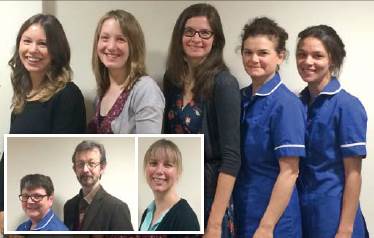One in five people admitted to hospital in the UK each year as an emergency have Acute Kidney Injury (Wang et al., 2012). The resource and economic burden upon the healthcare economy is considerable – it is estimated the additional cost is £500 million (NHS Kidney Care 2012). In the UK up to 100,000 deaths in hospitals are associated with AKI (NCEPOD, 20-09), indeed it is 100 times more deadly than MRSA infection (NICE). However it’s estimated that up to 30% could be prevented with the right care and treatment (NCEPOD, 20-09).
In 2014 NHS England published a Patient Safety Alert and a nationally agreed algorithm for detecting patients with AKI via their blood creatinine results. Dr Bisher Kawar, a consultant nephrologist at the Sheffield Kidney Institute (SKI), who had an interest in AKI, identified an opportunity to improve care for patients and contacted the Service Improvement Programme Management Office (PMO) for assistance.
The PMO works with and supports teams across the Trust to improve the quality and value of STH services for staff and patients via large scale change projects. The team’s approach is to focus on engagement and collaboration to ensure staff have the opportunity to shape, influence and give life to the change.
The aim of the AKI Project was to improve the prevention, recognition and treatment of AKI across STH. The multidisciplinary AKI team included nurses, doctors, pharmacists, a clinical scientist, a laboratory medicine IT manager, clinical coding staff and School of Nursing at the University of Sheffield who have worked together to develop:
• a new electronic report via the ICE requesting and reporting system for patients with AKI;
• clinical documentation to support staff in assessing and managing AKI;
• a patient information leaflet;
• a case study focused education programme and e-learning package for doctors, nurses and pharmacists and nurses in training;
• a means of clinically coding AKI to ensure that the receives the associated income.
Since the education programme launched in September 2014, the AKI team have trained over 1,000 nurses and clinical support workers, 95% of the Trust’s pharmacists, over 300 doctors and all F1 doctors are provided with an overview as part of their Trust induction.
98% of the staff trained say they now feel confident managing AKI and 100% are confident in applying what they’ve learnt in practice.
This has borne out in practice – 68% more cases of AKI are now identified via the ICE reports and managed using the clinical documentation. Not only has this resulted in improved care for patients, it’s also resulted in additional income for the Trust – in the first 6 months of the project, over £180,000 was generated via improved coding of AKI.
The PMO has worked closely with the AKI team to shape and coordinate the project but also to develop their capability to plan using process maps and action logs, collect data and measure improvement, and communicate and engage with staff effectively.
Louise Wild, a renal nurse and one of the two AKI nurse educator says “many of the concepts and tools we’ve learnt are useful outside of the project environment – we still use the SharePoint site and action logs to co-ordinate and track our work”. As a result of the work, Bisher is confident that the team will continue to improve patient care following the close of the project.
The PMO is currently working on 8 projects both across the Sheffield health community and is currently developing a training programme for staff interested in getting involved in large scale change. For more information, please email [email protected].

